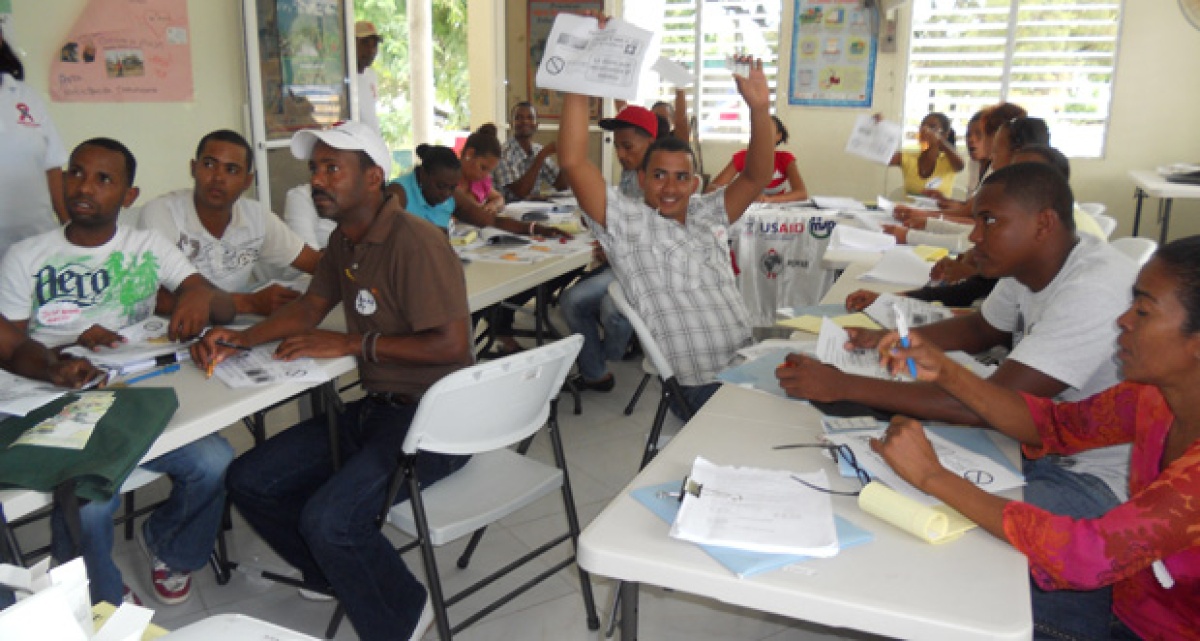How to train a community health worker
Posted on Dec 8, 2011

PIH's training team presents how they train community health workers and develop training materials at the American Public Health Association annual meeting.
By Kate Thanel and Jenny Lee Utech, PIH Training Team
Last month, PIH’s Training Team joined thousands of public health practitioners in Washington DC at the American Public Health Association (APHA) annual meeting. We were excited to meet others who worked with community health workers (CHWs), but we were a bit overwhelmed by the size of the conference – 12,000 people! Fortunately, we presented our work at a roundtable—a small, informal session where we could talk directly with groups who work with CHWs across the US and abroad.
At this session, we explained how CHWs are the backbone of PIH’s community-based approach to delivering health care. The work they do at PIH-supported sites around the world is varied and wide-ranging: educating the community, households, and individuals; connecting far flung rural communities with the health center or hospital; working with patients to help them adhere to drug regimens; responding to patient and family concerns; and providing psychosocial support.
Our trainings must prepare PIH CHWs to handle all of these roles and responsibilities, and also master basic clinical content. How do we manage to do this when the local situations and the CHWs themselves, can be very different from one site to another? It’s a long process! We communicate and collaborate with the clinical and community health program staff and the Ministry of Health officials at each site. These local partners define what CHWs need to be able to know and do, and we develop training materials to teach these skill that utilize learning activities that can be adapted to suit each specific context. The review process continues back and forth until all partners are satisfied that the materials are accurate, comprehensive, and relevant.
Learn about the PIH's Accompagnateurs Curriculum for CHWs.
During the APHA roundtable, we also explained how we pilot CHW training materials once they have been written, reviewed, and finalized. We want to find out how the CHWs respond not only to the particular training materials, but also to the training program as a whole. The pilot trainings help us test the program and structure at our sites in Rwanda, Lesotho, Malawi, and Haiti. First, we hold a Training of Trainers (TOT) for clinical staff, usually nurses, who will be the ones that train the CHWs. The TOT strengthens the teaching and facilitation skills of the clinicians, as well as their and knowledge base. It also helps to build the structure and on-the-ground skills needed to support a strong and on-going training program.
 |
|
|
Preparing oral rehydration solution during a cholera training at Zanmi Lasante, Haiti. |
During the TOT, trainers get the chance to practice role plays, case scenarios, and other activities –all participatory methods that have been proven to be the most effective with adult learners. We’ve seen TOT participants respond very positively when they try out these methods themselves. They’re able to draw on their own experience and expertise as they practice new skills and information. They also practice giving demonstrations ranging from mixing baby formula, to using condoms correctly, to preparing oral rehydration solution, all while the other participants observe them and provide feedback.
We’ve found that the lessons learned from these experiences stick with the training participants long after the training is over. As one participant from a TOT at Zanmi Lasante said, “I see myself as a different trainer now. I now have the knack and the necessary basics for training adults and to plan better all around.”
After the TOT, the new trainers deliver the training to CHWs over several sessions. During the training sessions we evaluate the materials, the trainers’ delivery, how well the training is organized, and how all the planning and logistics required before and during the training affect training delivery. We designate observers to provide us with daily feedback, we also arrange focus groups for participants and trainers, and we give pre-and post-tests to participants. These tools help us to see what’s feasible and what needs to be changed.
We shared these pilot testing experiences with roundtable participants at the APHA conference, who all asked us the same question: How could they get all those involved in a CHW program—clinical staff, administrators, program managers, government officials—to support the piloting of CHW training? We pointed to the success of the very first pilot of the CHW curriculum at our site in the Dominican Republic. The local program director invested time and effort meeting with key decision makers in the community, hospital, and government to plan the pilot and to follow-up afterward. She also made sure there was adequate preparation time for trainers, and sufficient budget and time to run the TOT and CHW training sessions. These strategies are part of a checklist of questions we devised to help trainers plan and carry out a successful training pilot.
Our CHWs are dedicated to their work. Conducting a thorough pilot helps us to improve the training programs that CHWs rely on to do their jobs well. As one CHW from Zanmi Lasante put it during a recent pilot training, “During this training, we learned new information that fortified our will, our determination, and our competence to better treat our patients.”
Kate Thanel is the Curriculum and Training Specialist for Zanmi Lasante, PIH's sister organization in Haiti. Jenny Lee Utech is PIH's Curriculum and Training Manager.

